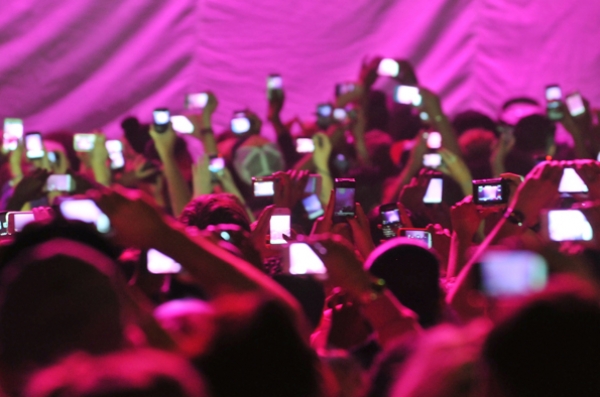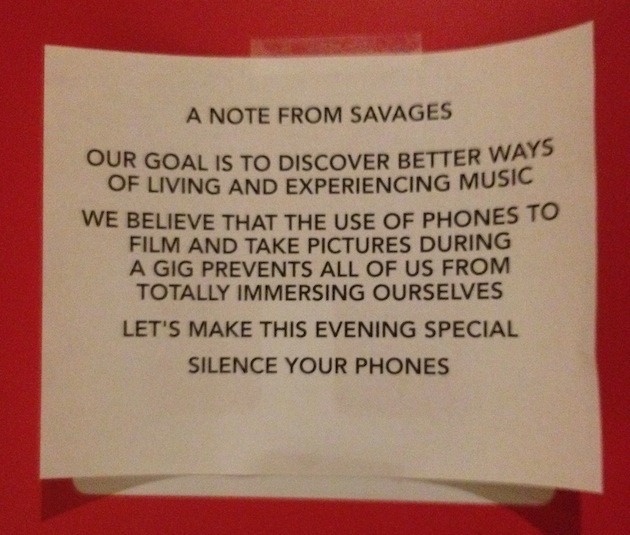 Music
Music
Phone bans at concerts spark continued debate
by Richard Trapunski
July 22, 2013
Cellphone bans at Toronto concerts have audiences divided, but it's also becoming a safety concern.
“Zooey doesn’t want to see phones!”
That instruction, purportedly spoken by Zooey Deschanel’s manager at the inaugural Toronto Urban Roots Festival on July 4, became a rallying cry across the internet a few weeks ago, echoing between sites like Gawker, Stereogum, and A.V. Club, and reopening an intensifying debate about cell phones at concerts. At first a polite entreaty by Deschanel’s folk-pop band She & Him to disconnect and “instead enjoy the show they have put together in 3D,” it quickly intensified as security guards policed the venue, shining flashlights in the faces of amateur mobile photographers who disobeyed the request.
Security guards at @turfTO are now flashing flashlights in the faces of fans in the first few rows who dare pull out their phones. #turfTO
— Rob Duffy (@rob_duffy) July 5, 2013
That’s becoming a common scenario as bands like the Yeah Yeah Yeahs, Jack White, and Wilco take a stand against concertgoers who opt to watch their concerts through their mobile viewfinders, dividing fans into two camps: those who believe the over-prevalence of phones at shows is ruining the communal live music experience for everyone, and those who think, as paying customers, they should have the right to watch the show any way they see fit. Some artists, like Dan Deacon, have even toyed with incorporating fans’ phones into their live shows.
The debate may be getting old, but it isn’t going away. In fact, it’s reaching a breaking point. Since the TURF incident, a whole spate of other bands have followed suit. In the past few weeks alone, Savages, Bjork, and Bob Dylan have all banned phones and cameras from Toronto shows. But according to a number of event security staff, it’s not just a question of modern etiquette—it’s actually a legitimate safety concern.
“It’s really been ramping up in the last couple of months, and it’s becoming problematic,” says one 20-plus-year event security veteran. Speaking to AUX under condition of anonymity, she argues that fans aren’t being given enough prior notice to sheath their phones or leave their expensive cameras at home, which has become a source of danger to both fellow concert goers and security guards, who are required to enforce tour policies. “People are coming in angry, then there’s alcohol, and then it becomes a problem.”
Until recently the argument, though heated, has mostly taken place in comment sections and across social media, but in recent weeks it has become harder to argue in abstract terms. Last week at Toronto’s Mod Club, Savages lead singer Jehnny Beth confiscated a phone from a fan in front of the stage. At the Molson Amphitheatre stop for Bob Dylan’s Americanarama tour, a group of fans were escorted out by the police after threatening a pair of security guards who repeatedly asked them to put their phones away.

The problem isn’t so much the no-cameras/no-phone policies, but the way they’re often enacted. A concert ticket acts as a contractual agreement between a showgoer and the venue to follow house rules, but beyond the usual blanket policy (most often something along the lines of “no professional cameras, no video or audio recording devices”), restrictions are dictated by artists and enforced by house security. These specific tour policies tend to be consistent from city to city, but they aren’t usually shared in advance on social media so fans often aren’t aware until they reach the venue.
“On occasion the artist tells us in advance whatever restrictions they have, but more often than not we’re just told a couple of hours before doors,” says Jeff Cohen, owner of Collective Concerts (the promotion company behind She & Him and Savages’ recent performances), though he doesn’t have a problem with the specific no-phone requests. “Think about what it would be like the other way around if you as an audience member watched an artist take a three minute break on stage to text his wife. I don’t think as fans we would deem it appropriate, so perhaps us entitled ones should re-think some of the things we do at shows out of the same respect for artists.”
Graham Wright, solo artist and keyboardist for Ontario indie rockers Tokyo Police Club, is more concerned with the tone of the debate than the actual debate itself. Wright doesn’t have any specific phone policy, but he has tried to curb moshing, and he considers the polarized fan response to be analogous.
“People aren’t just disagreeing with the notion of banning cell phone photography, they’re shocked that anyone would dare suggest such a thing,” he writes in an email to AUX. “Bands put a colossal amount into creating an experience for you. The performer has a deep investment in your leaving the concert feeling wonderful, because that’s how we earn a living!”
“The idea of banning cell phones (or moshing or stage diving or crowd surfing or, loathe as I am to publically agree with Morrissey on anything, the sale of meat at the concession stands) might be more than just an oversensitive artiste trying to shape the world in their own image. It can be the extension of a pointed effort to make something beautiful and dazzling and transporting for you. And if you’re willing to put aside your pathological need to document and collect and share and appropriate everything you encounter to add to the giant Pinterest that is your life, you might just have an experience you weren’t expecting.”

A sign at Savages’ recent Toronto show.





